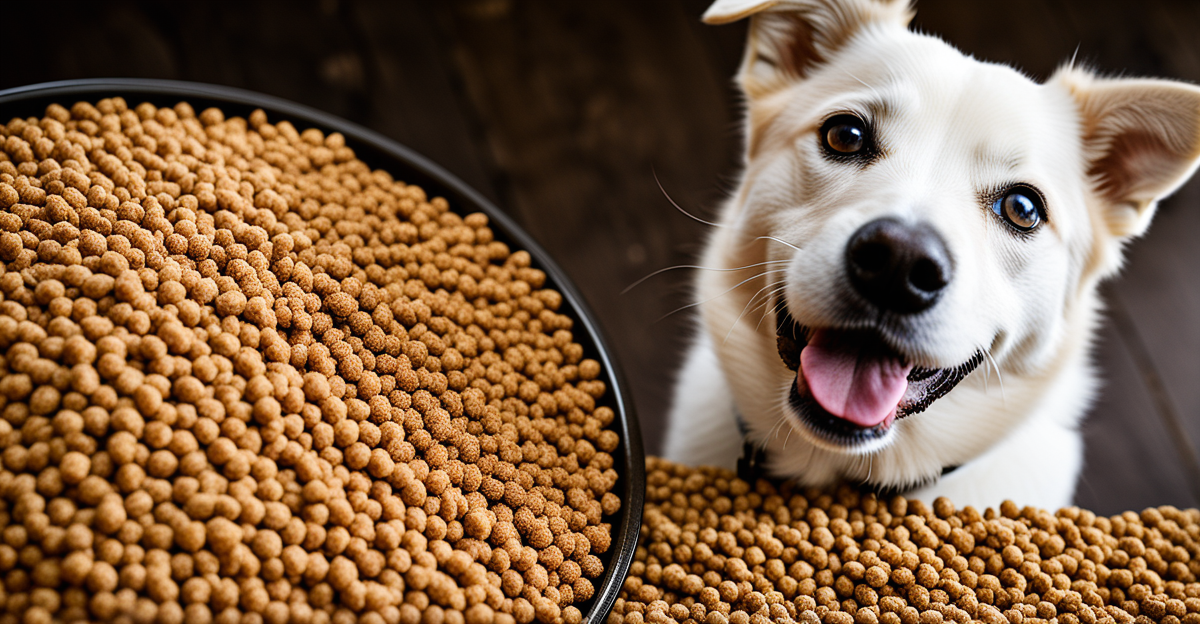Essential Criteria for Choosing Pet Food in the UK
Choosing the right pet food in the UK requires careful attention to pet food selection based on species, breed, age, and size. A puppy, for instance, needs a highly digestible formula rich in protein, while elderly dogs benefit from food that supports joint health. Understanding these distinctions is fundamental to optimal UK pet nutrition.
Special dietary needs also affect choices. Pets with allergies or health conditions like kidney disease require specialized formulas often available through vet guidance. Recognizing symptoms and adjusting diets accordingly is part of responsible pet ownership.
Also read : What Are the Essential Factors to Consider Before Adopting a Pet in the UK?
How do you identify the best food formula? Start by reviewing ingredient lists for quality proteins and balanced nutrients. Then, evaluate the type suitable for your pet’s life stage—wet, dry, or mixed diets all serve different purposes. For example, dry food is convenient and helps dental health, while wet food boosts hydration.
In the UK, pet owners should also consider local food regulations and ingredient origins to ensure safety and quality. Tailoring the diet this way contributes to longevity and well-being, making informed how to choose pet food UK decisions essential for every pet owner.
Also to discover : How Can You Ensure Optimal Health for Your Pets in the UK?
Essential Criteria for Choosing Pet Food in the UK
Selecting the right pet food in the UK requires careful consideration of several factors related to your pet’s specific needs. How to choose pet food UK mainly revolves around matching the food to your pet’s species, breed, age, and size. Puppies and kittens require different nutrition compared to senior dogs or cats. Choosing appropriately ensures balanced UK pet nutrition tailored to developmental or maintenance stages.
Understanding special dietary requirements is crucial. Pets with health conditions such as kidney disease or allergies need diets formulated to address these issues. For instance, hypoallergenic or prescription diets help manage sensitivities while supporting overall well-being. This careful pet food selection improves health outcomes and prevents nutritional deficiencies.
To identify suitable food formulas, assess ingredients and nutrient profiles aligned with your pet’s requirements. Steps include evaluating protein sources, fat content, and presence of supplements like omega fatty acids. Consulting ingredient lists and nutritional adequacy statements aids in this process. Following such a structured approach ensures you provide your pet with nutritious, tailored meals that cater to their unique lifestyle and health status.
Decoding Pet Food Labels in the UK
Understanding how to choose pet food UK begins with mastering reading pet food labels. UK pet food labelling requirements mandate that packaging includes the product name, ingredients list, guaranteed analysis, and feeding instructions. This transparency enables informed decisions aligned with your pet’s needs.
Look for high-quality pet food ingredients UK such as named animal proteins (e.g., chicken, lamb) and avoid vague terms like “meat meal.” Grains are common, but discerning owners may prefer grain-free or specific grain types based on allergies or sensitivities.
Nutritional claims like “complete and balanced” follow FEDIAF guidelines, ensuring the food meets minimum nutrient standards for UK pets. Certifications and quality assurance marks indicate compliance with UK pet food regulations and offer reassurance about safety and nutrition.
Reading labels also means noting additives and preservatives. Natural preservatives are preferable to synthetic ones for overall pet health. Mastering label interpretation is a vital skill in effective pet food selection and improving your pet’s wellness through informed UK pet nutrition choices.
Decoding Pet Food Labels in the UK
Understanding reading pet food labels is vital for informed pet food selection in the UK. UK pet food labelling requirements mandate that packaging clearly lists all pet food ingredients UK to ensure transparency and safety. Each label must include the ingredient list, nutritional adequacy statement, feeding guidelines, and batch information. This helps owners confirm the product suits their pet’s specific needs related to UK pet nutrition.
Key ingredients to look for include named meat sources like chicken or beef, as these provide essential proteins. Avoid vague terms such as “meat meal” or excessive fillers like corn, which may offer low nutritional value. Understanding ingredient order is crucial—the first few listed represent the highest content.
Interpreting nutritional claims and certifications requires critical attention. Claims like “complete and balanced” mean the food meets standards set by nutritional authorities. Certifications from credible bodies validate safety and quality assurances. Knowing how to read these labels helps pet owners make precise decisions aligned with their pet’s health demands, directly supporting effective how to choose pet food UK practices.
Essential Criteria for Choosing Pet Food in the UK
Selecting the right pet food in the UK hinges on understanding your pet’s species, breed, age, and size, all critical for optimal UK pet nutrition. For example, puppies need diets rich in protein and calories to support growth, while senior pets benefit from foods that support joint and organ health. Ignoring these factors risks poor health outcomes.
Special dietary needs, such as allergies or chronic conditions like kidney disease, require tailored pet food formulas. Recognising these needs early and choosing vet-recommended options can improve longevity and comfort. This is central to effective pet food selection in the UK context.
How to choose pet food UK involves checking ingredient quality and nutritional adequacy. Look beyond flashy packaging to ingredient lists featuring named animal proteins, appropriate fat levels, and beneficial supplements like omega-3 fatty acids. Also, consider food types: dry kibble supports dental care, while wet food assists hydration. These steps ensure feeding aligns with your pet’s unique health and lifestyle demands—key to confident and informed how to choose pet food UK decisions.
Essential Criteria for Choosing Pet Food in the UK
Choosing the right pet food demands aligning it with your pet’s species, breed, age, and size. Why is this critical? Nutritional needs vary greatly; for example, puppies require energy-dense, protein-rich diets to support growth, while adult or senior pets benefit from formulas that maintain health without excess calories. Ignoring these factors risks under- or overfeeding, compromising UK pet nutrition.
What about special dietary needs? Pets suffering allergies or conditions like kidney disease require carefully selected diets, often involving limited ingredients or prescription foods. This targeted pet food selection helps prevent flare-ups and supports recovery, tailoring nutrition to health challenges.
How do you identify suitable food formulas? Begin by scrutinizing the ingredients list for quality protein sources and appropriate fat levels. Consider food type: dry kibble suits dental health and convenience, while wet food enhances hydration. Supplements like omega-3 fatty acids and antioxidants strengthen immunity and coat condition.
Ultimately, mastering how to choose pet food UK involves understanding your pet’s unique profile and carefully matching it with available products. This ensures balanced nutrition, supports longevity, and improves quality of life through informed choices tailored to your pet’s specific needs.
Essential Criteria for Choosing Pet Food in the UK
Carefully matching pet food to your animal’s species, breed, age, and size is fundamental for achieving optimal UK pet nutrition. Each factor influences nutrient demands: puppies and kittens require energy-dense, protein-rich diets to support rapid growth, while mature or senior pets benefit from foods formulated to maintain weight and assist joint or organ health. Ignoring these specifics can cause imbalances or health issues, making precise pet food selection critical.
Understanding special dietary needs enhances this process. Pets with allergies or chronic health conditions like kidney disease often need tailored formulas, including hypoallergenic or prescription diets. These specialized options address sensitivities and health management, helping to prevent complications and improve wellbeing. Recognising when a pet requires such consideration is a key part of responsible how to choose pet food UK.
To identify the best food formulas, start by scrutinizing ingredients for quality proteins and balanced fats. Consider types—dry kibble aids dental health and convenience, while wet food enhances hydration, supporting overall health. Supplements such as omega-3 fatty acids and antioxidants further contribute to immunity and coat condition. Thorough evaluation ensures your choice aligns with your pet’s lifestyle and health status, cementing intelligent UK pet nutrition decisions.
Essential Criteria for Choosing Pet Food in the UK
Choosing pet food demands precise alignment with your pet’s species, breed, age, and size. But how do you choose food that truly supports UK pet nutrition? The answer lies in understanding these key factors first. Puppies and kittens, for example, require nutrient-dense formulas rich in protein and calories to fuel growth, while adult and senior pets benefit from balanced diets that maintain health without excess energy intake.
Special dietary requirements further complicate pet food selection. Pets with allergies, sensitivities, or chronic conditions like kidney disease need tailored formulas, often formulated with limited ingredients or prescription components. Ignoring these can worsen health issues. Consulting veterinary advice is invaluable here.
How to choose pet food UK effectively means scrutinizing ingredient lists for named proteins—such as chicken or lamb—and balanced nutrient profiles including omega fatty acids and antioxidants. Consider the food type as well: dry kibble supports dental hygiene, while wet food boosts hydration. Stepwise evaluation focused on your pet’s unique profile ensures choices that promote longevity and well-being, embedding good practices in UK pet nutrition at every feeding.
Essential Criteria for Choosing Pet Food in the UK
Choosing the right pet food starts with aligning it to your pet’s species, breed, age, and size, which directly influence their nutritional demands. For example, puppies need calorie-dense diets rich in protein for growth, while adult pets require balanced maintenance formulas. Ignoring these factors can lead to nutritional imbalances, affecting your pet’s health.
Special dietary requirements also play a critical role in pet food selection. Pets with allergies or chronic conditions like kidney disease may need specialized diets, such as hypoallergenic or prescription formulas, tailored to manage their health effectively. Recognizing these needs often involves vet consultation, making it essential in your how to choose pet food UK process.
To identify suitable food formulas, thoroughly examine ingredient lists for named animal proteins and balanced fat content. Consider the food type—dry kibble aids dental health and convenience, whereas wet food boosts hydration. Supplements like omega-3 fatty acids contribute to immune and coat health. This methodical approach ensures your choices support precise UK pet nutrition, addressing both lifestyle and health status to promote longevity and well-being.
Essential Criteria for Choosing Pet Food in the UK
Choosing the right pet food starts with precisely matching it to your pet’s species, breed, age, and size. Why focus on these factors? Nutrient requirements vary significantly; for instance, puppies need calorie-dense, high-protein diets to support growth, while adult or senior pets benefit from maintenance diets tailored to prevent obesity and promote organ health. Ignoring these adjustments can lead to nutritional imbalances affecting your pet’s wellbeing and longevity.
How to choose pet food UK wisely also means recognising special dietary requirements. Pets suffering from allergies, sensitivities, or chronic health issues such as kidney disease require carefully formulated diets. These diets often involve hypoallergenic ingredients or veterinary prescription formulas designed to alleviate symptoms and support recovery. Awareness of these health factors ensures responsible pet food selection choices.
The final step is identifying suitable food formulas by scrutinising ingredient quality and nutrient profiles. Look for named animal proteins, balanced fat content, and supplements like omega-3 fatty acids which promote immune function and healthy skin. Also, consider food types: dry kibble aids dental health and convenience, while wet food improves hydration. This detailed evaluation aligns with best practices for UK pet nutrition, ensuring your pet’s diet supports their unique lifestyle and health needs.









